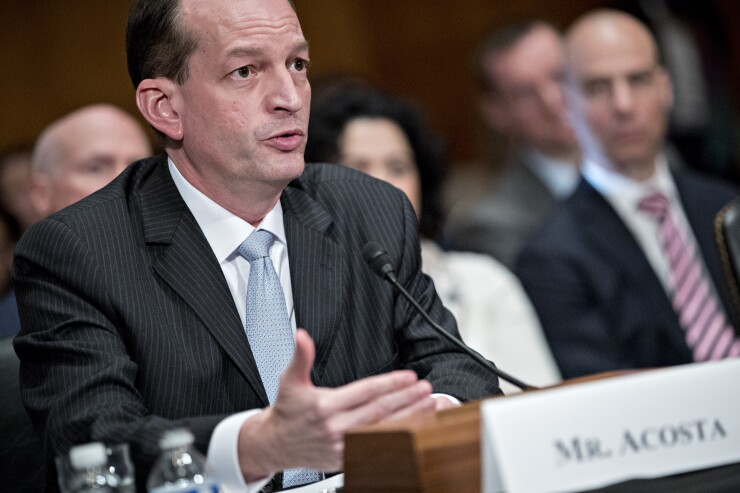The Senate confirmed Alexander Acosta as Secretary of Labor, leaving the newly minted cabinet member to oversee the fate of the fiduciary rule.
President Trump’s nomination of Acosta, a former U.S. attorney, passed the Senate on Thursday night in a 60 to 38 vote. He will now proceed to the DoL rule on a tight deadline.
The Department of Labor postponed the regulation's implementation date to June 9 while it

Many brokerage firms have recently petitioned the Labor Department to postpone implementation even longer; some have asked for a year or more to prepare their compliance plans.
"We urge Secretary Acosta to make addressing the fiduciary issue a top priority," FSI CEO Dale Brown said in a statement. "With the June 9 deadline looming, there is no time to waste in protecting retirement savers’ access to quality, affordable advice and services."
Meanwhile, fiduciary advocates and Democrats such as Massachusetts Senator Elizabeth Warren have staunchly defended the rule, attempting to rally public opinion behind preserving it. Most Democrats in the Senate joined her in voting against the nomination.
-
The new offerings could boost returns to investors by 50 basis points, according to a Morningstar study.
April 17 -
The firm previously told some customers they would be transferred from their advisers to a self-managed system, but then backtracked and said it's holding off on the changes.
April 12 -
CEO Jon Stein bemoaned the rule's 60-day delay and mulled what would happen if it was repealed entirely.
April 10
Completely rescinding the rule would be a complicated process; the Obama administration spent years designing the regulation, which has survived court challenges.
Aron Szapiro, director of policy research at Morningstar,
"I think they'll come up with another way to comply that doesn't necessarily involve a private right of action where you could be sued by investors," Szapiro said.
Annual class action settlements resulting from the rule would range between $70 million and $150 million, according to
Acosta may order a longer delay of the rule or seek to revise it. Advocates for the rule have threatened litigation against any repeal.
President George W. Bush appointed Acosta to the National Labor Relations Board in 2002. He later become a federal prosecutor and served in the Department of Justice's Civil Rights Division.





